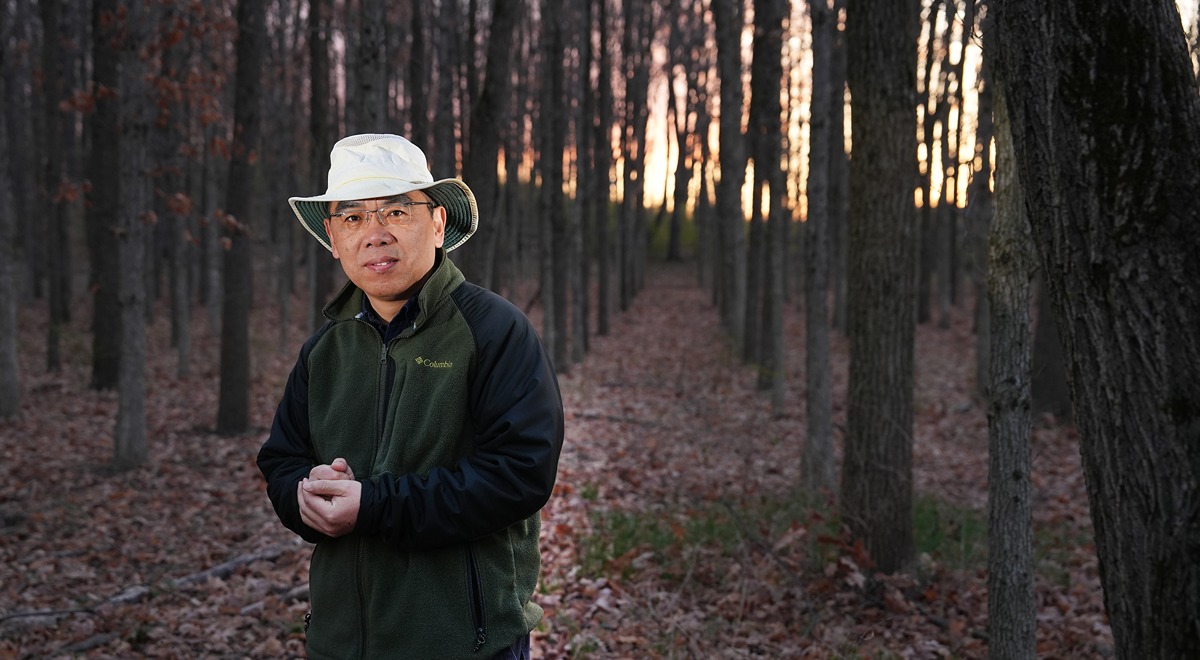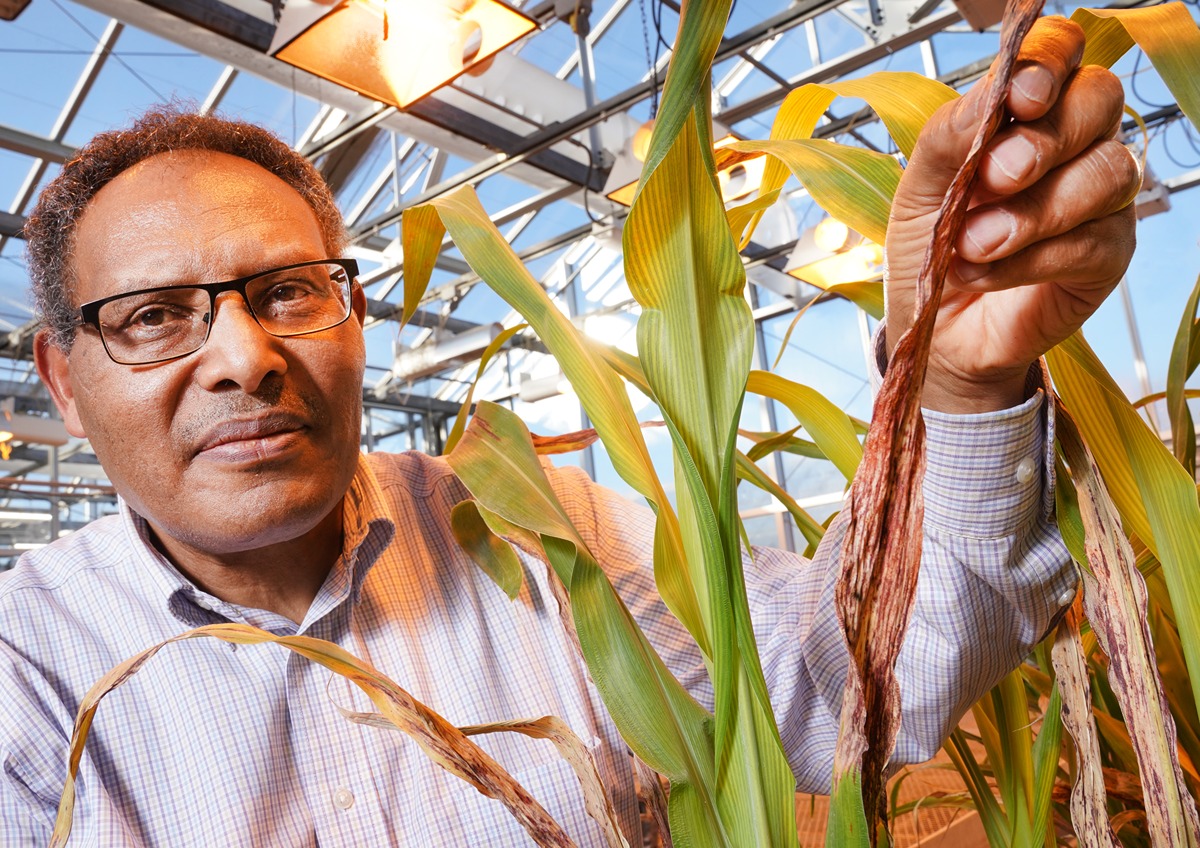Purdue agriculture professors named AAAS Fellows
Purdue College of Agriculture professors Songlin Fei and Tesfaye Mengiste have been named fellows by the American Association for the Advancement of Science (AAAS). The fellows are composed of distinguished scientists, engineers and innovators who are recognized for their achievements.
Fei says he is honored and also acknowledges his colleagues’ contributions. “I consider myself fortunate to stand on the shoulders of giants, great scientists and students. What’s most exciting is that the AAAS is recognizing the importance of forestry. This acknowledgment not only underscores the continued relevance of traditional disciplines like forestry but also signifies support for their modernization through interdisciplinary collaboration.”
Mengiste also pays credit to his collaborators. “My lab’s work serves as the foundation for developing technologies that offer practical solutions to real-world agricultural challenges. I am thrilled that the significance of our research is being acknowledged by AAAS.”
Songlin Fei
Sturdy walking shoes, high-visibility vests, bucket hats and yellow measuring tape wrapped over trucks at chest height were once the tools-of-the-trade for forestry. Advancements in digital imaging and technology now streamline data collection and analysis and are transforming how forests are managed.
“It's akin to relying on shouting from a distance instead of embracing cell phones,” Songlin Fei, a professor and Dean’s Chair for Remote Sensing in the Department of Forestry & Natural Resources said regarding the traditional methods of his field. “Most of our current decision-making in forestry often hinges on sparse data. Digital forestry revolutionizes this by leveraging technology to provide comprehensive, cost-effective insights, enabling us to make more informed decisions.”
By incorporating everything from robotics and artificial intelligence to lasers that pinpoint height variations across a landscape and specialized cameras capable of imaging a plant in more color bands than what humans can perceive, Fei and his collaborators’ efforts are reshaping the landscape of forestry and agriculture. The Institute for Digital Forestry now includes over 30 faculty members across five colleges collaborating on projects such as addressing wildfires, tree disease epidemics and costly and labor-intensive research methods.
Fei explains that these partnerships empower agricultural sciences to contend with the rapid challenges posed by climate change and population growth. He specifically cites the collaboration with the College of Engineering, which provides engineers numerous practical avenues for applying their ground-breaking innovations. One collaboration Fei references involves a mechanical engineering lab that is developing an application to assist landowners in identifying and appraising trees from their smartphones.
Despite starting his career in the ecological side of forestry—interested in invasive species, climate change and land management—Fei always considered himself more of a “number person.” His ability to see the connections between often disconnected fields has made him a strong leader in integrative research.
“Songlin is in many ways a Renaissance scientist, someone who views forests from multiple perspectives and sees the potential for how all those views can work together to paint the pictures we need to revolutionize the future of our forests and their global impact,” said Glenn W. Sample Dean of Agriculture Bernie Engel. “At Purdue, we talk about digital forestry measuring every tree in the world–which will be a remarkable accomplishment. But it’s what Songlin and his growing league of colleagues will do with the information they gather that will change the world.”
As focused as Fei is on his research, he remains highly committed to students and building digital literacy into the undergraduate curriculum in Purdue. The College of Agriculture now offers minors and certifications in data collection, data analysis and even flying drones.
“We conducted a survey of potential employers, and they were willing to pay an extra ten to twenty thousand dollars to someone with digital skills such as operating a drone. There’s a demand for digital skills in forestry. We’re one of the first programs in the nation to meet this call, and we hope to show other institutions that not only is this doable, but it’s the future,” said Fei.
Tesfaye Mengiste
Botany and Plant Pathology Department Head and Professor Tesfaye Mengiste has spent his academic career dedicated to unraveling the molecular mechanisms underlying plant disease resistance, particularly against fungal pathogens. His ultimate objective is to generate improved disease control strategies by generating tools and knowledge that expedite resistance breeding.
“By delving into this area, my goal is to contribute to the genetic enhancement of crops, which holds great promise for controlling plant diseases,” says Mengiste.
Mengiste’s academic career began in his home country of Ethiopia, where he earned his bachelor’s degree in plant sciences from Haramaya University. He went on to earn a master’s degree in plant biotechnology from the University of London and a doctorate in plant molecular biology from the University of Basel in Switzerland.
Mengiste has spent a significant portion of his career researching sorghum, an important food crop with the potential to feed vulnerable populations throughout the world. Mengiste led the Purdue research team that made the critical discovery of a gene in sorghum named, Anthracnose Resistance Gene1 or ARG1.
“Although some natural resistance to fungal disease was known in sorghum, genes that confer such widespread resistance had not been identified,” Mengiste said. “It is remarkable that a single gene leads to resistance across a broad spectrum of fungi and multiple strains of the anthracnose fungus. We could have stopped after identifying the ARG1 gene, but we drilled deeper. If we hadn’t, we might have not recognized how this gene is controlled in a complex way and how it has evolved to fend off fungal infection. Now we have a much greater understanding of the gene’s regulation and additional insight into an emerging field that could become revolutionary to plant science.”
“The importance of this work cannot be overestimated,” said Gebisa Ejeta, a Presidential Fellow and distinguished professor of agronomy at Purdue and executive director of the Purdue Center for Global Food Security, who served on the research team. “This was a significant scientific breakthrough and a culmination of decades of collaborative sorghum improvement research at Purdue along with partners in developing countries.”
“We need more robust disease control to sustain the world food supply, and these remarkable plants are one step ahead of us,” Mengiste said. “Different varieties of sorghum have evolved with different strengths and resistance to disease. Through genetics and plant science we are trying to help them along in this process of adapting to a changing environment.”
Previous research conducted in the Mengiste lab identified the Arabidopsis BIK1 gene, which encodes a multifunctional protein and serves as a major regulator of plant resistance to pathogens. This gene is currently under intense study by numerous labs worldwide.
“Tesfaye is an international leader in his field and leads a team that is conducting life-changing research. It is incredibly gratifying to see him honored by the AAS for his many accomplishments,” said Bernie Engel, the Glenn W. Sample Dean of Agriculture.








